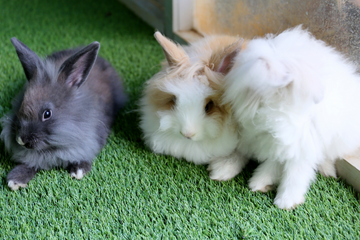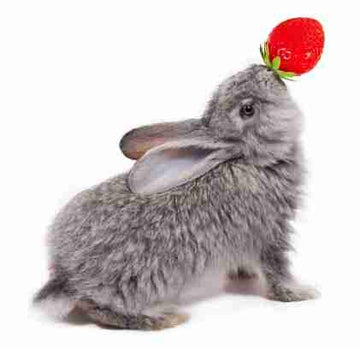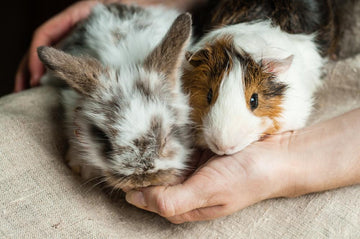Tips for Bonding Rabbits & Guinea Pigs
Rabbits can be more aggressive than guinea pigs, even if they have lived together for years. You must provide safe hiding places for guinea pigs if rabbits decide to bully them. The entrance to the hiding place should be large enough for the guinea pig but too small for the rabbit. This effort ensures your guinea pigs have a safe place to go when rabbits become too much for them.
Click Here For a Beginners Guide to Rabbit Care.

2. Feed Separately
Guinea pigs require more Vitamin C than rabbits. Their systems do not synthesize it on their own, and if rabbits bully their way into all the Vitamin C-rich food, your guinea pigs’ health will suffer. Create separate eating areas for each species. You can move them to different sides of an enclosure and shut a barrier or install a mesh divider.
3. Watch for Aggressive Behavior
Rabbits play differently and what may be fun for them could be an assault on guinea pigs! Guinea pigs have high bone density, but rabbits can injure them. Watch out for kicking and mounting behavior. Prolonged bullying is also a bad sign--even if guinea pigs have a spot to hide. You don’t want either species living in a stressful environment, so create separate enclosures for each species if these behaviors are constant.
4. Neuter Male Rabbits
Getting your male rabbits neutered will help to lessen any aggression they could have. You can also get your male guinea pigs neutered, but even left intact you'll encounter fewer problems with them as guinea pigs have a more relaxed and laid-back personalities. But intact male rabbits are territorial and frequently aggressive. If you keep unneutered male rabbits in the same enclosure as guinea pigs, you ask for trouble and vet bills. We recommend that you neuter your rabbits, but if you choose not to then place them in a different pen away from guinea pigs.
5. Maintain Each Species in Pairs
If you keep rabbits and guinea pigs together, keep them in pairs. There should be two rabbits for every two guinea pigs. Guinea pigs and rabbits communicate differently. While rabbits use more body language, guinea pigs are vocal. If you wish to keep one of both species, know that this will not provide needed companionship. They’ll never communicate with each other as well as their own species. If you’re concerned about loneliness, know that the best companion for a guinea pig or rabbit is another of their species.
6. Design a Large Enclosure
Guinea pigs and rabbits best coexist in large outdoor enclosures with plenty of room for all of them to play. If you plan to stuff them in a cage indoors, expect confusion, boredom, aggression, and vet bills, especially if you do not let them out of the cage to explore. Instead, make a sheltered space outdoors (or indoors) with plenty of obstacles and chew toys. Keep the enclosure secure from other animals. If you plan to make this enclosure their only home, make sure you have a way of separating the animals at feeding time.
7. Monitor Health Conditions Closely
Guinea pigs can catch Bordetella bronchiectasis from rabbits, dogs, and cats. While rabbits can interact with dogs and cats, assuming they get along, guinea pigs can never interact with them because of this health hazard. Guinea pigs with robust immune systems can reject this dangerous bacteria and never show symptoms. But be cautious if any guinea pigs seem ill. If you adopt guinea pigs who are sick or very young, keep them away from rabbits until they’re stronger.
Important Reminder
Every guinea pig and rabbit are different, some coexist very easily together and some have issues. Therefore it's important to keep an eye on how they interact with each other. If issues come about, separate them.
Here at Rabbit Hole Hay our commitment is helping you keep your small pets happy and healthy. So while you help your rabbits and guinea pigs thrive together, make top nutrition a priority. Shop our ultra premium hays and know that you're little family member is eating only the best!

Fun and Unique Names for Rabbits

Healthy Rabbit Treats for Hoppy Pets






![RHDV2 Critical Information + Frequently Asked Questions [Updated 03/20/2025]](http://www.rabbitholehay.com/cdn/shop/articles/rhdv2-critical-information-frequently-asked-questions-V1.png?v=1742490107&width=360)

